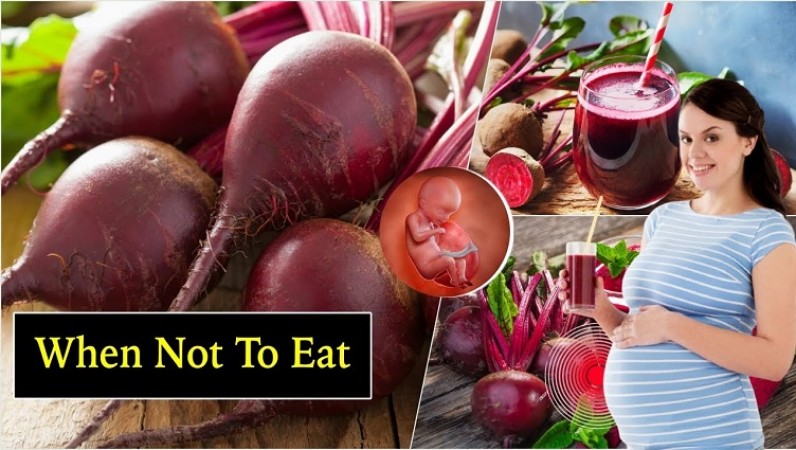
Beetroots, with their vibrant color and a plethora of nutrients, have long been considered a superfood due to their numerous health benefits. Packed with vitamins, minerals, and essential nutrients like nitrates, fiber, and antioxidants, beets are celebrated for their potential to boost overall health. However, as beneficial as they are for many, certain individuals, including pregnant women and those with specific health conditions, might need to exercise caution or avoid consuming beets altogether.
The Nutritional Powerhouse of Beets
Before delving into who should avoid beets, let’s acknowledge their impressive nutritional profile. Beets contain an array of nutrients such as folate, magnesium, potassium, vitamin B-6, iron, thiamin, riboflavin, glutamine, zinc, and selenium. These compounds contribute to various bodily functions and are particularly advantageous for maintaining overall well-being.
Health Benefits of Beets
Boosting Heart Health: Beets are rich in nitrates, which are believed to help lower blood pressure, reduce the risk of heart disease, and improve cardiovascular health.
Supporting Brain Function: The nitrates present in beets may enhance cognitive function and improve blood flow to the brain, potentially aiding in mental performance.
Enhancing Exercise Performance: Some studies suggest that consuming beet juice can improve athletic performance by increasing stamina and oxygen efficiency during exercise.
Detoxification and Liver Health: Beets contain compounds that support liver detoxification processes and promote liver health.
Who Should Avoid Beets?
While beets offer numerous health benefits, there are specific groups of people who should exercise caution or refrain from consuming them due to potential health risks:
1. Pregnant Women:
Risk: Beets contain high levels of nitrates, which might be harmful to unborn babies if consumed in excess. High nitrate intake during pregnancy can lead to complications such as methemoglobinemia, a condition that reduces the blood's oxygen-carrying capacity, posing a risk to fetal development.
Recommendation: It's advisable for pregnant women to moderate their beet consumption or consult a healthcare professional before including them in their diet.
2. People with Low Blood Pressure:
Risk: Due to their blood pressure-lowering effects, consuming beets or beet-derived products could further reduce blood pressure levels, potentially leading to hypotension (low blood pressure) and associated symptoms like dizziness or fainting.
Recommendation: Individuals with low blood pressure should limit their intake of beets to avoid exacerbating their condition.
3. Cancer Patients:
Risk: While research on this topic is ongoing, some studies suggest that the high nitrate content in beets might interact negatively with certain cancer treatments or medications. Additionally, cancer patients undergoing treatment often have weakened immune systems, and consuming raw or unpasteurized beet juice might pose a risk of foodborne illness.
Recommendation: Cancer patients should consult their healthcare provider before adding beets to their diet during treatment.
4. People with Allergies:
Risk: Beets can trigger allergic reactions in some individuals, leading to symptoms like itching, hives, swelling, or in severe cases, anaphylaxis.
Recommendation: Those with known allergies to beets or related vegetables like carrots should avoid them to prevent allergic reactions.
5. Those with Liver Problems:
Risk: Although beets have detoxifying properties beneficial for the liver, individuals with existing liver conditions should be cautious due to the high levels of oxalates in beets, which might exacerbate certain liver issues or lead to complications.
Recommendation: People with liver problems should consult their healthcare provider before consuming beets regularly.
6. People with Kidney Stones:
Risk: Beets are a source of oxalates, compounds known to contribute to kidney stone formation. Consuming beets excessively might increase oxalate levels, potentially aggravating kidney stone issues.
Recommendation: Individuals prone to kidney stones should moderate their intake of oxalate-rich foods, including beets, to minimize the risk of stone formation.
7. Arthritis Patients:
While research linking beet consumption directly to worsening arthritis symptoms is limited, some individuals with specific forms of arthritis, particularly gout, might need to be cautious due to the high oxalate content in beets, which can exacerbate joint pain associated with these conditions.
Recommendation: People with arthritis, especially gout, should monitor their intake of oxalate-rich foods like beets and discuss dietary considerations with their healthcare provider.
Beets are undoubtedly a nutritional powerhouse offering numerous health benefits for many individuals. However, certain populations, including pregnant women and those with specific health conditions such as low blood pressure, allergies, liver problems, kidney stones, cancer, or arthritis, should be mindful of their beet consumption or consult with a healthcare professional before making it a regular part of their diet. Moderation and personalized guidance are key when considering the inclusion of beets in a health-conscious diet plan.